Last week Dustin Smith and Sam Tideman discussed the intermediate state–what happens after death but before resurrection on the last day. Although most Christians affirm the folk idea of going immediately to heaven or hell at death, Smith and Tideman argue that the Bible teaches the dead are in Sheol or Hades. However they disagree on what’s happening there. Smith holds to soul-sleep while Tideman believes the dead are conscious. We went through many scriptures last time, but today we’ll discuss two critical texts on this subject: the witch of Endor and the parable of the rich man and Lazarus.
Listen to this episode on Spotify or Apple Podcasts
—— Links ——
- More about Dustin Smith here
- More about Sam Tideman here
- Check out these other episodes discussing the intermediate state
- Get the transcript of this episode
- Support Restitutio by donating here
- Join our Restitutio Facebook Group and follow Sean Finnegan on Twitter @RestitutioSF
- Leave a voice message via SpeakPipe with questions or comments and we may play them out on the air
- Intro music: Good Vibes by MBB Attribution-ShareAlike 3.0 Unported (CC BY-SA 3.0) Free Download / Stream: Music promoted by Audio Library.
- Who is Sean Finnegan? Read Sean’s bio here

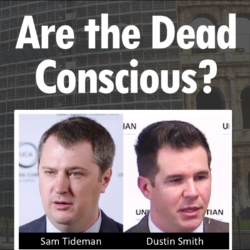
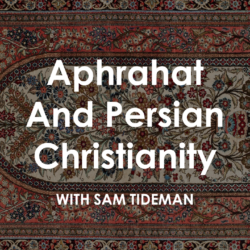

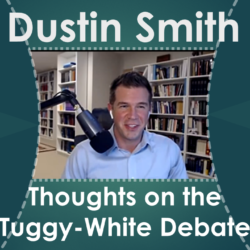
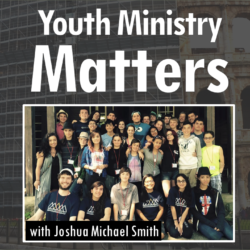
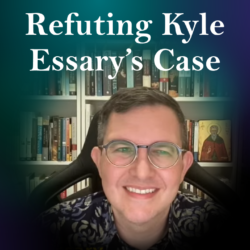
Thanks for hosting this cordial discussion. It’s not everyday that we can hear two to three people respectfully disagreeing on important subjects and still be able to walk away as friends.
My question has to with the correct method for understanding difficult Bible verses. At the conclusion, Sean praised Sam for taking Luke 16 at “face value.” Mr Smith, on multiple occasions, attempted to set the passages in their context (e.g., the poetry that dominates the prophet Isaiah, the Deuteronomistic history of 1 Samuel as it relates to the theology of Deuteronomy, the contemporary Egyptian parallel story to Luke 16, and the Prodigal son’s “death and resurrection”). Can you help me understand why taking a difficult passage at “face value” is the better method than striving to set verses in their context? Please help me see what I am missing. Thank you for the good show.
Well, very insightful! I was delightfully surprised to find I am in disagreement with all three of you regarding the witch of Endor account! I am absolutely a physicalist, and I take Yahweh at his word when he tells humans, “From dust you are and from dust you will return.” I’d like to suggest, as I’ve heard many proponents of open theism (which I also embrace), we should avoid limiting God. Those who oppose open theism state that God couldn’t possibly create a world in which he limits his very own knowledge in order to have authentic relationships with his humans. Yet, he must, to allow for free will, and I believe the Bible provides incontrovertible evidence that God choses to not know the future, to react in “real time” to how his creatures act.
Similarly, to say God is incapable of re-creating an individual from the dust, giving her all her prior memories, and making her the “same person” and not a clone is to limit God. There truly is, from my humble perspective, nothing at all anywhere in Scripture that indicates humans are in some conscious state or actually exist in any form at all. If we are but dust and return to dust, we need to ask: What is the sleeping or subconscious state of dust? Does the Bible say dust has some secret actual conscious or sleeping state? Wouldn’t God have told his creatures, from Adam onward, that when they die, some part of them is really still in existence? Why can’t we allow for the euphemism of “sleep” to be merely a descriptor to indicate humans are not eternally gone but still exist in God’s mind such that he can, at any time (and he has set a time) re-create them AS IF awakening them from sleep?
So much more to be said on this, but if you are going to do a “four views” book, I volunteer to give an alternative view that I believe is aligned with the entirety of Scripture. (Oh, and a lot to say about the parable of the rich man too!). Grateful for these wonderful, respectful dialogues and for all three of you humble men of God!
I think the obvious question, if this was in fact Samuel, is did he defy his God twice, in order to give Saul a prediction?
First, he disobeyed him be participating in communications with the dead.
Second, God specifically told him to never speak to Saul again.
Also, are we certain that the prophecy was accurate?
Did Saul die the next day?
There was quite a bit of troop movements before the battle.
Look at a map. A lot of miles were covered.
As I read the story, the only person who talked was the witch. Saul never heard or saw Samuel.
We only have Sauls assumption that it was Samuel.
Yes, the witches words implied it was Samuel, is that enough proof?
I’m convinced that everyone in the room thought it was Samuel, but I’m not sure that’s the same thing.
The use of Elohim to describe what she saw should also be troubling.